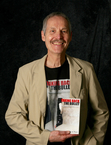You Don’t Need to Know Everything Before You Start Writing
 http://jimpotterauthor.com/wp-content/uploads/2022/01/You-Dont-Need-to-Know-Everything-Before-You-Start-Writing.mp3You Don’t Need to Know Everything Before You Start Writing
http://jimpotterauthor.com/wp-content/uploads/2022/01/You-Dont-Need-to-Know-Everything-Before-You-Start-Writing.mp3You Don’t Need to Know Everything Before You Start Writing*
 Eastside Cemetery, Hutchinson, KS. Author’s photo.
Eastside Cemetery, Hutchinson, KS. Author’s photo.Charles Collins gravestone pdf
I’ve been researching and researching, and I still have unanswered questions. I’d like to learn more about Charles C. Collins and his ancestors before I write his story, but I can’t wait forever. I’ve been down so many research rabbit holes that I’ve become comfortable living underground. I don’t think it’s covid related. Now, I must surface and write.
The U. S. Census, findagrave.com, newspapers.com, ancestry.com, articles and books on history, and contacts with descendants of Collins, have been extremely helpful, but I’ve reached a point where my extensive knowledge of the available material is more than enough for me to begin writing a cohesive story.
Sandee Taylor, a member of the Kansas Authors Club, has similar issues. She’s diagnosed too much researching as “research paralysis.” Sandee states, “We love doing it as much as we love writing. It’s a good thing, but it slows the writing process.”
“I, Jim Potter, promise to make writing a priority. I will stop looking for the Trans-Atlantic ship that took Grandfather Collins to Louisiana from Dublin. I will accept, for now, that I may never know the details about Charlie’s father fighting for General Andrew Jackson in the War of 1812. Mary’s maiden name—Charlie’s mother—may remain a mystery to me. If I never locate the Collins plantations in Louisiana, I will survive. If I can’t confirm that Charlie lived in Leavenworth and Lawrence, Kansas, that’s okay for now. I’d like to know the final resting place of Charlie’s parents and grandparents, but that may never happen. Bottom line, I don’t need to know everything to write the story about the first sheriff of Reno County, Kansas.”
When I write fiction, I don’t obsess about knowing every detail before I start. Instead, I learn incrementally as the story evolves, and I enjoy the surprises. Fiction or nonfiction, I research so that my stories are credible, and I allow space for inspiration and creativity.
One type of writer, the “plotter,” plans the work before starting; the “pantser” writes by the seat of his or her pants, planning very little. For non-fiction writing, especially, I’m a Potter plotter.
 Eastside Cemetery, Hutchinson, KS. Author’s photo.
Eastside Cemetery, Hutchinson, KS. Author’s photo.Loretta Collins gravestone pdf
Here are some facts, as I know them, about Charles C. Collins. His father and grandfather were plantation owners near Baton Rouge, Louisiana. They raised cotton and sugar and owned slaves. Charlie was born in Montgomery County, Alabama in 1844 (or 1845), the second of thirteen children. Despite his southern family influence, Charlie enlisted in the Union Army in 1861 when he was about 17 years old.
I want to understand Charlie’s decision to fight for the Union when he lived in Kansas. Were his parents’ pro-slavery or pro-union? What caused Charlie, who probably lived in Alabama until he was a teenager, to become patriotic and to fight in Mr. Lincoln’s War?
Most people think our history never changes. On the contrary. The history we know changes as we uncover more information. That’s why I get so caught up in digging for additional details.
Here’s my writing plan. I don’t need to know everything. I’ll tell the reader what I know, what I don’t know, and I’ll be specific about what I still want to know. While I’m writing, I can still dream about uncovering hidden treasure from historians, genealogists, and long-lost relatives of Charles Collins.
*
Until next time, happy writing and reading.

The post You Don’t Need to Know Everything Before You Start Writing appeared first on Sandhenge Publications.



